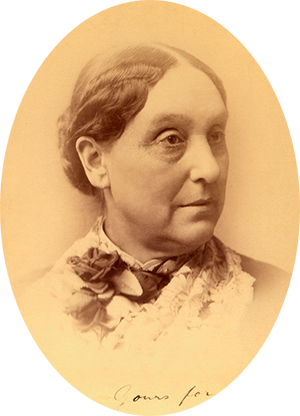 Abigail Scott Duniway, ca. 1890. (Courtesy of Wikimedia Commons)
Abigail Scott Duniway, ca. 1890. (Courtesy of Wikimedia Commons)

"The young women of today, free to study, to speak, to write, to choose their occupation, should remember that every inch of this freedom was bought for them at a great price. It is for them to show their gratitude by helping onward the reforms of their own times, by spreading the light of freedom and of truth still wider. The debt that each generation owes to the past it must pay to the future."
Duniway worked as an educator, editor, and activist for over 50 years. She wrote prolifically, publishing stories and serialized novels through her weekly newspaper,
The New Northwest, devoted to women’s issues and voting rights. A colleague of Susan B. Anthony and other luminaries, Duniway was active on a national level, but won greatest success in her native Pacific Northwest. She was instrumental in organizing the winning vote for universal woman suffrage in Idaho, then Washington, and finally in her home state of Oregon.
Her prime tactic, called the “still hunt” after the sportsman’s tactic of quietly stalking game animals, sought to avoid confrontation. She believed that men, and specifically their votes, were the keys to winning woman suffrage and was wary of antagonizing them. To this end, Duniway worked to convince men through humor, wit, and gentle persuasion rather than marches and outspoken resistance. Her conservative approach was lauded by some but considered ineffective by many younger and more radical suffragists.
Duniway’s efforts were staunchly opposed by her brother, Harvey Scott, himself an editor of the dominant newspaper in the state:
The Oregonian. She blamed him for the five repeated failures to secure women’s voting rights in Oregon, while other suffragists more often blamed Duniway’s inflexible commitment to “still hunt” tactics. When the state did pass suffrage legislation in 1912, a 79-year-old Duniway personally wrote the Oregon Woman Suffrage Proclamation in her own hand.
Related Images
View a handbill announcing a lecture by Abigail Scott Duniway. Duniway loved public speaking and never looked back after giving her first public speech in 1870. She actively lectured, upwards of 200 lectures some years, and often spoke extemporaneously, despite Susan B. Anthony's caution to the contrary. (Courtesy of University of Oregon Library)
Next:
Marie Equi, M.D. >